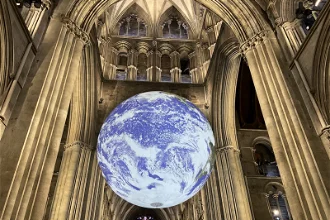Caring for Creation

"Then, one day, the lockdown restrictions were lifted...People went back to the places they had missed and spent time with friends and family there. They had picnics, played games and drank into the night. They were happy again...and the Earth wept" (Jen Worsley).
Our Earth weeps as people continue, for example, to litter indiscriminately. Many persons have been sharing photos on social media showing the large amount of litter on beaches, roads etc. since our beaches and rivers have re-opened. There continues to be a lack of respect for our environment.
This year the Catholic Church marks the fifth Anniversary of Pope Francis' encyclical entitled: Laudato Si': On care for our common home (2015). In it Pope Francis "critiques consumerism and irresponsible development, laments environmental degradation and global warming, and calls all people of the world to take 'swift and unified global action.'" The encyclical is an urgent call to conversion. We are called to heed the cry of the earth and the cry of the poor who are disproportionately affected by climate change and environmental degradation.
As Crux reports, he blames "unfettered greed" for increased pollution, inequality, and global warming, "mainly as a result of human activity," and urges everyone to act quickly, as the Earth begins "to look more and more like an immense pile of filth." This 184-page document "touches on a variety of ways that human beings interact with their surroundings, from deforestation and unclean water to architecture and urban planning. "
He offers possible solutions to the problem of environmental deterioration, including: Reaching a global consensus to implement sustainable and diversified agriculture, develop renewable energy, manage marine and forest resources, and ensure universal access to drinking water; Replacing fossil fuels that contribute to global warming; Making better use of abundant solar energy; Conducting environmental assessments before embarking on any local or national projects; Preventing economic and technological developments from deteriorating people's quality of life; and Promoting more environmental education.
He asks people to make a "selfless ecological commitment" to improving the environment. As the saying goes, the heart of the problem is in the human heart. Change begins with us. Let's commit to change our lifestyle, production and consumption e.g. "avoiding the use of plastic and paper, reducing water consumption, separating refuse, cooking only what can reasonably be consumed, showing care for other living beings, using public transport or car-pooling, planting trees, turning off unnecessary lights, or any number of other practices" (Pope Francis).
Shortly before the Vatican synod of bishops on the Amazon region in October 2019, which focused heavily on environmental issues, Pope Francis said in an interview that what he fears the most for the planet, is the disappearance of biodiversity "not just because of the elimination of potential resources and the ecological balance that results, but also because thousands of species destroyed by human activity will no longer give glory to God, and We have no such right."
Read a new study published in a paper on June 1, 2020 in the Proceedings of the National Academy of Sciences of the USA www.pnas.org/content/117/24/13596#ref-46 - entitled: "Vertebrates on the brink as indicators of biological annihilation and the sixth mass extinction." The study reports that species are going extinct hundreds or thousands of times faster than the expected rate. The researchers - Gerardo Ceballos, Paul R Ehrlich, and Peter H Raven - also found that one extinction can cause ripple effects throughout an ecosystem, leaving other species vulnerable to the same fate. "Extinction breeds extinctions". As the researchers state:
"The ongoing sixth mass extinction may be the most serious environmental threat to the persistence of civilization, because it is irreversible. Thousands of populations of critically endangered vertebrate animal species have been lost in a century, indicating that the sixth mass extinction is human caused and accelerating...In addition, species are links in ecosystems, and, as they fall out, the species they interact with are likely to go also. In the regions where disappearing species are concentrated, regional biodiversity collapses are likely occurring. Our results reemphasize the extreme urgency of taking massive global actions to save humanity's crucial life-support systems...The recent United Nations report on biodiversity and ecosystem services estimates that a quarter of all species face extinction, many within decades... The extinction crisis, like the toxification and climate crises to which it is tied, poses an existential threat to civilization...Future generations deserve better from us."
Creation is the work of God and is God's gift to us. Let's become advocates for God's Creation.
Leela Ramdeen is Chair of the Catholic Commission for Social Justice in the Archdiocese of Port of Spain, Trinidad & Tobago, (CCSJ) and Director of CREDI


















